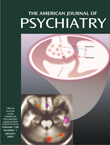Insight Into Illness in Schizophrenia, Schizoaffective Disorder, and Mood Disorders With Psychotic Features
Abstract
OBJECTIVE: Deficits in insight have been found in one study to be more common and severe in patients with schizophrenia than in patients with schizoaffective and major depression with and without psychosis but not more severe than they are in patients with bipolar disorder. The goals of this study were to replicate this finding independently and to clarify whether patients with schizophrenia differ from patients with bipolar disorder in a larger study group. METHOD: Using the Scale to Assess Unawareness of Mental Disorder, the authors evaluated 29 inpatients with schizophrenia, 24 with schizoaffective disorder, and 183 with mood disorders with psychotic features (153 with bipolar disorder and 30 with unipolar depression). RESULTS: Patients with schizophrenia had poorer insight than patients with schizoaffective disorder and patients with psychotic unipolar depression but did not differ from patients with bipolar disorder. CONCLUSIONS: The lack of significant differences between patients with schizophrenia and patients with bipolar disorder was not a result of low statistical power. This replication and more detailed examination of diagnostic group differences in insight have clinical, theoretical, and nosological implications.



